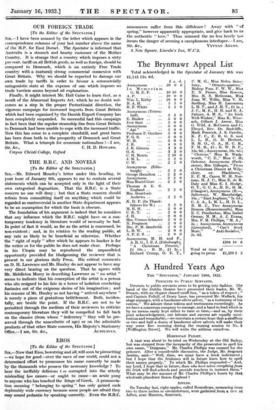THE B.B.C. AND NOVELS [To the Editor of the SPECTATOR.]
Sin,—Mr. Edward Mousley's letter under this heading, in your issue of January 9th, appears to me to contain several statements which can be accepted only in the light of their own categorical dogmatism. That the B.B.C. is a State concern no one will deny ; but that a State concern should refrain from committing itself on anything which could be regarded as controversial in another State department appears to be an assumption for which the basis is obscure.
The foundation of his argument is indeed that he considers that any influence which the B.B.C. might have on a con- temporary tendency in literature would of necessity be bad. In point of fact it would, as far as the artist is concerned, be non-existent ; and, in its relation to the reading public, at any rate as likely to be beneficial as otherwise. Whether the " right of reply" after which-he appears to hanker is for the writer or for the public he does not make clear. Perhaps in his Utopia may be reproduced the unparalleled opportunity provided for bludgeoning the reviewer that is present in our glorious daily Press. His critical comments on D. H. Lawrence and Mr. Huxley do not appear to have any very direct bearing on the question. That he agrees with Mr. Middleton Murry in describing Lawrence as " no artist " seems to indicate that his conception of the artist is a person who sits resigned to his fate in a tower of isolation crocheting fantasies out of the exiguous skeins of his imagination ; and his censure of Mr. Huxley as not having " arrived anywhere is merely a piece of gratuitous belittlement. Both, inciden- tally, are beside the point. If the B.B.C. are not to be permitted through the medium of their reviewers to criticize contemporary literature they will be compelled to fall back on the classics (from whose " indecency " they will be pre- served through the anaesthetic of age) or on the admirable products of that other State concern, His Majesty's Stationery


































 Previous page
Previous page